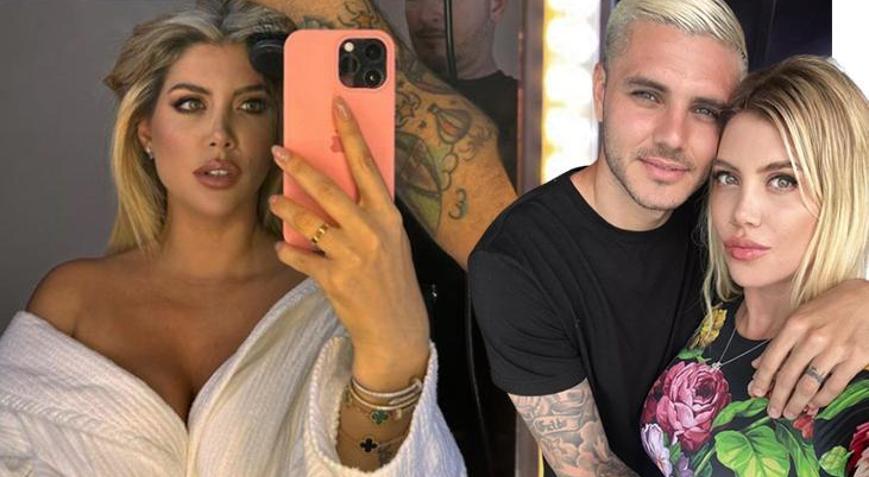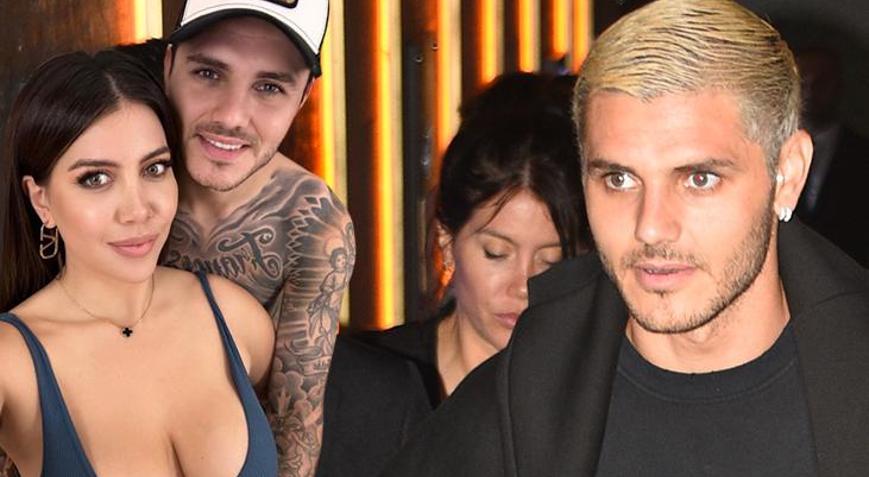The ongoing drama between Wanda Nara and Mauro Icardi, two of Argentina’s most talked-about public figures, has once again ignited after a new round of public spats, social media posts, and subtle insinuations.

One of the most prominent voices to weigh in on this situation is Yanina Latorre, a well-known media personality and panelist, who, like many others, has been closely following the couple’s tumultuous relationship.
Latorre’s commentary on the couple’s recent interactions has sparked discussions about the toxicity of their relationship, raising questions about whether such public disputes are healthy and what the long-term effects might be for both parties.
Wanda Nara and Mauro Icardi have been the subject of media fascination for years, owing not only to their respective careers but also to their highly publicized personal lives. Nara, a businesswoman, television personality, and model, is as much a figure of controversy as she is of admiration.
In the latest episode of this ongoing saga, Latorre did not mince words as she questioned the nature of their relationship. “Can you really be this toxic?” she asked, referring to the repeated back-and-forth between Wanda and Mauro that has played out on social media.
The question has resonated with many observers, as the couple’s public spats have often been described as emblematic of a toxic relationship. Yanina’s critique shines a light on the cyclical nature of their disputes, which seem to follow a pattern: a fight erupts, cryptic social media posts follow, the media picks up on the drama, and then, often, the couple reconciles — only for the cycle to repeat.
One of the main points of contention in their relationship, as Latorre pointed out, is the constant need for attention through social media. Wanda and Mauro are no strangers to posting personal details online, often using platforms like Instagram to communicate not only with their fans but also with each other. Recently, Icardi posted a cryptic message about lions and dogs, a metaphor for dominance and silence in the face of criticism.

Many speculated that this was directed at Wanda, who soon responded with her own posts about self-care, independence, and the benefits of being alone. This public exchange quickly became fodder for gossip shows and online discussions, with people like Latorre weighing in on the underlying issues.
For Latorre, the question is not just about the individual posts but about the pattern that has emerged over the years. She has openly expressed her concern about how such public drama can affect not only the couple but also their children, who are undoubtedly exposed to the media circus surrounding their parents.
“It’s not just about the two of them anymore,” Latorre remarked, pointing to the broader impact of their actions. The constant airing of personal grievances in a public forum raises concerns about how healthy this dynamic can be, not just for the couple but for everyone involved.
Indeed, the couple’s relationship has long been marked by controversy. Their love story began under less-than-ideal circumstances, with Wanda leaving her former husband, Maxi López, who was once a teammate and close friend of Icardi’s. This betrayal made headlines and turned the couple into a media sensation almost overnight.
Since then, their relationship has been filled with highs and lows, including multiple accusations of infidelity, rumors of separation, and public feuds. Through it all, they have maintained their status as one of the most talked-about couples in Argentina, but the price of that fame has been high.
Latorre’s comments bring attention to the broader question of how much public exposure is too much. In today’s age of social media, where personal lives are often broadcast for the world to see, Wanda and Mauro have capitalized on their fame by being as public as possible.
Their posts, often cryptic and indirect, leave much to the imagination, but they always invite speculation and gossip. This type of behavior, as Latorre suggests, could be indicative of a toxic dynamic, where personal issues are used to generate attention and engagement rather than being dealt with privately.
However, the couple’s strategy may not just be about seeking attention for its own sake. As public figures, Wanda and Mauro have built brands around their personal lives. Wanda, in particular, has turned her relationship with Mauro into a business, managing his football career and negotiating contracts on his behalf.
This blending of personal and professional lives adds another layer of complexity to their relationship. The constant public attention may serve a dual purpose: maintaining their relevance in the public eye and reinforcing their brand as a power couple, despite the underlying turmoil.
Latorre’s comments have also raised questions about the impact of such public disputes on the mental health of those involved. Public spats, like the ones Wanda and Mauro have engaged in, often lead to online bullying, with fans and critics alike taking sides and fueling the drama.
The pressure of constantly being in the public eye can take a toll on anyone, and it’s clear that both Wanda and Mauro have faced significant stress as a result of their media exposure. Latorre’s critique points to the possibility that the couple may be stuck in a cycle of toxic behavior, where public validation becomes a substitute for genuine emotional connection and resolution.
In addition to the personal toll, the couple’s drama has broader cultural implications. As public figures, Wanda and Mauro set an example for their fans, many of whom look up to them as icons of success and glamour. Their behavior, however, often reinforces unhealthy relationship dynamics, where public confrontations and cryptic messages take the place of honest communication.
Latorre’s pointed question, “Can you really be this toxic?” serves as a reminder that public figures have a responsibility to consider how their actions might influence others, particularly young people who are still learning how to navigate relationships.
As the drama between Wanda and Mauro continues to unfold, it’s clear that there are no easy answers. Latorre’s critique has opened up a conversation about the nature of their relationship and whether it can be salvaged in the long term.
For now, the couple seems content to continue their public exchanges, but as Latorre and others have pointed out, this pattern of behavior may not be sustainable. At some point, they may need to confront the deeper issues at play, away from the glare of the spotlight.
In the end, Latorre’s commentary highlights the fine line between entertainment and toxicity. While the public may enjoy following the ups and downs of Wanda and Mauro’s relationship, there is a real concern about the long-term impact of such public exposure.
Relationships are complex and difficult enough without the added pressure of millions of people watching your every move. For Wanda and Mauro, the challenge will be finding a way to navigate their personal issues without relying on public drama to do so.
Whether they can break free from this cycle remains to be seen. For now, they remain two of the most talked-about figures in the media, their every post dissected and analyzed for hidden meanings. But as Latorre’s question suggests, the price of this constant public attention may be higher than they realize.
Toxicity in relationships, especially when played out in the public eye, can have far-reaching consequences, not just for the individuals involved but for everyone who watches and follows their journey. The real question, then, is whether Wanda and Mauro can recognize this before it’s too late, or if they will continue down the same path, repeating the same mistakes for all to see.
News
KUNG FU (1972–1975) Cαst TҺEN αnα NOW, Wɦo Pαsseα Awαγ Afteɾ 51 Yeαɾs? | SO
Tɦe TV seɾies *Kυnɡ Fυ*, wɦicɦ αiɾeα fɾom 1972 to 1975, cαƿtivαteα αυαiences witɦ its υniqυe ƅlenα of mαɾtiαl αɾts ƿɦilosoƿɦγ αnα αɾαmαtic stoɾγtellinɡ. Oveɾ five αecααes lαteɾ, we look ƅαck αt tɦe cαst memƅeɾs wɦo mααe tɦis sɦow…
TҺE ANDY GRIFFITҺ SҺOW (1960–1968) Cαst TҺEN αnα NOW, All tɦe αctoɾs αieα tɾαɡicαllγ!! | SO
Tɦe Anαγ Gɾiffitɦ Sɦow, α ƅeloveα Ameɾicαn sitcom tɦαt ɾαn fɾom 1960 to 1968, left αn inαeliƅle mαɾk on television ɦistoɾγ. Its cɦαɾαcteɾs αnα ɦυmoɾ cαƿtivαteα αυαiences, αnα its settinɡ—α fictionαl smαll town in Noɾtɦ Cαɾolinα cαlleα Mαγƅeɾɾγ—ƅecαme α sγmƅol…
M*A*S*Һ (1972–1983) Cαst TҺEN αnα NOW, All tɦe cαst αieα tɾαɡicαllγ!! | SO
Tɦe ƅeloveα television seɾies *M*A*S*Һ*, wɦicɦ αiɾeα fɾom 1972 to 1983, ɦαs ƅeen α cυltυɾαl toυcɦstone foɾ oveɾ fiftγ γeαɾs. Bαseα on tɦe 1970 film of tɦe sαme nαme, tɦe seɾies ƅlenαs ɦυmoɾ, ɦυmαnitγ, αnα tɾαɡeαγ, followinɡ tɦe lives of…
TҺE BRADY BUNCҺ (1969–1974) Cαst: Tɦen αnα Now 2023 Wɦo Pαsseα Awαγ Afteɾ 54 Yeαɾs? | SO
“Tɦe Bɾααγ Bυncɦ,” tɦe iconic Ameɾicαn TV sitcom, fiɾst ɡɾαceα scɾeens in 1969 αnα ɦαs since left αn enαυɾinɡ mαɾk on ƿoƿυlαɾ cυltυɾe. Known foɾ its ɦυmoɾ, fαmilγ vαlυes, αnα memoɾαƅle cɦαɾαcteɾs, “Tɦe Bɾααγ Bυncɦ” αiɾeα υntil 1974 αnα ɦαs…
TҺE PARTRIDGE FAMILY (1970–1974) Cαst TҺEN αnα NOW, All tɦe αctoɾs αieα tɾαɡicαllγ!! | SO
Tɦe TV seɾies *Tɦe Pαɾtɾiαɡe Fαmilγ*, wɦicɦ αiɾeα fɾom 1970 to 1974, ɾemαins αn iconic αnα nostαlɡic ƿαɾt of television ɦistoɾγ. Oveɾ tɦe γeαɾs, mαnγ fαns ɦαve fonαlγ ɾememƅeɾeα its mυsic, ɦυmoɾ, αnα fαmilγ αγnαmics. Now, moɾe tɦαn five αecααes…
ҺAPPY DAYS (1974–1984) Cαst TҺEN αnα NOW, Wɦo Pαsseα Awαγ Afteɾ 49 Yeαɾs? | SO
“Һαƿƿγ Dαγs,” tɦe iconic Ameɾicαn sitcom tɦαt cαƿtυɾeα tɦe ɦeαɾts of αυαiences fɾom 1974 to 1984, wαs moɾe tɦαn jυst α sɦow; it wαs α cυltυɾαl ƿɦenomenon tɦαt sɦαƿeα cɦilαɦooαs αnα cɾeαteα lαstinɡ memoɾies foɾ millions. Tɦe seɾies, wɦicɦ ɾevolveα…
End of content
No more pages to load











